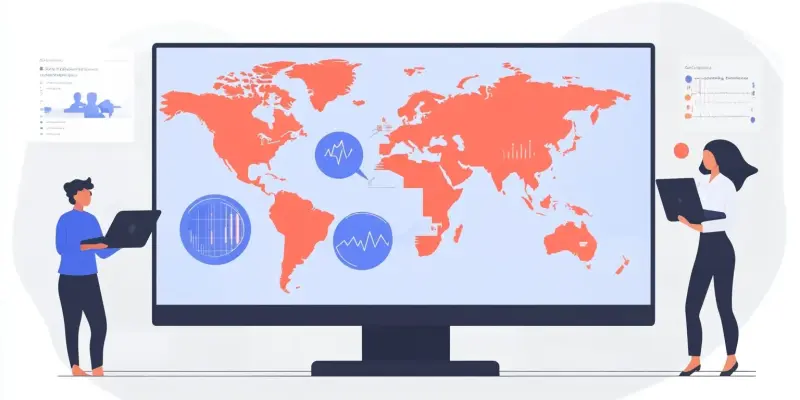The data science industry has undergone tremendous growth, becoming a cornerstone of modern business strategies. Today, data is not just a byproduct of business operations but a crucial asset that drives decision-making processes. This transformation has resulted in an escalating demand for data science experts who can derive strategic insights from large datasets. Companies are actively seeking skilled professionals to develop machine learning models, improve business outcomes, and collaborate on innovative solutions. Organizations such as Amazon, Binance, UST, and Harnham are at the forefront of this trend, marking unique opportunities across different regions.
The Global Demand for Data Science Professionals
Diverse Job Markets and Regional Opportunities
The surge in demand for data scientists is occurring on a global scale. Companies across the globe, from the United States to Singapore and beyond, have recognized the potential of data-driven strategies in enhancing their competitive edge. In the United States, companies like Kadence and financial institutions offer positions that require a deep understanding of machine learning, Python, SQL, and cloud platforms. In major tech hubs such as Bangalore, companies like UST are seeking talented professionals capable of solving intricate business challenges using advanced data science techniques.
In regions like Singapore, Binance is at the cutting edge of leveraging data science for fintech innovations. Their focus on integrating machine learning models and data-driven solutions into financial services highlights the essential role of data science in the ongoing fintech revolution. Meanwhile, Harnham in San Francisco is actively seeking individuals who can blend technical acuity with business insight, reflecting the multifaceted responsibilities data scientists hold today. These opportunities demonstrate how different regions are not just participating in the data science boom but are becoming hotspots for pioneering innovation.
Non-Traditional Sectors Embrace Data Science
While technology giants and fintech companies have led the way, data science’s applications have permeated non-traditional sectors, creating even more diverse career opportunities. For instance, the healthcare industry is increasingly relying on data science to enhance patient outcomes and streamline operations. Hospitals and research institutions are seeking data scientists to develop predictive models that can forecast patient needs, optimize resource allocation, and contribute to personalized medicine.
The retail sector is another area where data science is making significant inroads. Retailers are now leveraging big data to understand consumer behavior, manage inventory more efficiently, and refine marketing strategies. These developments have opened up roles for data scientists to analyze complex datasets to extract valuable insights, tailor recommendations, and improve customer experience. These non-traditional sectors illustrate the expansive reach and impactful applications of data science, highlighting its importance across various industries.
Skills and Tools in High Demand
Key Programming Languages and Machine Learning
Programming languages and machine learning frameworks are cornerstones in the skill set of a data science professional. Proficiency in Python and SQL is often a prerequisite, as these languages facilitate the creation and management of data pipelines, enabling the analysis of extensive datasets. Machine learning algorithms are another critical area, with companies expecting candidates to be well-versed in building, testing, and implementing these models to solve complex business problems.
Continuous learning in this rapidly evolving field is vital. Open-source libraries such as TensorFlow and scikit-learn offer advanced functionalities for machine learning, assisting data scientists in refining their models and expanding their analytical capabilities. Familiarity with these tools is increasingly becoming a standard requirement, emphasizing the need for aspiring data scientists to stay updated with the latest advancements. The constant refinement of skills through courses, certifications, and hands-on experience is essential for career progression in this dynamic field.
Integrative Tools and Collaborative Efforts
Beyond programming languages and algorithms, experience with integrative tools like Azure, Tableau, and various cloud platforms is highly valued. These tools enable data scientists to visualize data insights compellingly, making it easier for stakeholders across the organization to grasp complex information. Effective communication of data findings is crucial for implementing data-driven strategies and driving business transformation. Therefore, skills in utilizing these platforms significantly enhance a data scientist’s value within a company.
Collaborative efforts are another critical aspect of a data scientist’s role. Today, the most effective data-driven solutions arise from teamwork, involving close coordination with other departments like marketing, finance, and operations. Data scientists must possess the communication and interpersonal skills needed to work alongside these teams, ensuring that insights are integrated efficiently into existing workflows. This aspect of the job underscores the hybrid nature of data science roles, which blend technical acumen with the ability to navigate organizational dynamics.
Conclusion: Future Directions and Career Advancement
The data science field has experienced remarkable growth, establishing itself as a key element of modern business strategies. In today’s world, data is no longer just a byproduct of business operations but is a vital resource that shapes decision-making processes. This evolution has led to a growing demand for data science professionals capable of extracting strategic insights from vast amounts of data. Companies are on the lookout for experts who can develop machine learning models, enhance business outcomes, and collaborate on pioneering solutions. Notable organizations such as Amazon, Binance, UST, and Harnham are leaders in this trend, presenting distinct opportunities across various regions. These companies recognize the value of data and are actively investing in talent to stay ahead in a competitive market. As data continues to influence business practices, the need for skilled data scientists is only expected to increase, solidifying their role as indispensable assets in the corporate world.

